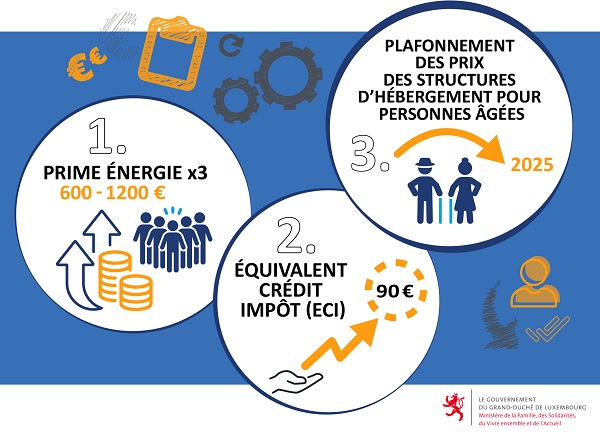 Credit: MFSVA
Credit: MFSVA
On Friday 14 June 2024, Luxembourg's Ministry for Family Affairs, Solidarity, Living Together and Reception of Refugees announced new energy measures in favour of vulnerable households.
The ministry stressed that the fight against poverty was one of its priorities, placed within a general government policy to strengthen the purchasing power of households. For the ministry, supporting the gradual expiration of the energy price cap with targeted social measures in favour of vulnerable households is necessary, in order to mitigate the financial repercussions.
"A sudden rise in energy prices risks confronting vulnerable households with new difficulties. For the government, it is essential to strengthen our efforts to support disadvantaged households and prevent more people from being affected by the risk of poverty," emphasised Max Hahn, Luxembourg's Minister for Family Affairs, Solidarity, Living Together and Reception of Refugees.
Concretely, the following measures will be implemented:
1. Energy bonus
- Increase in the income limit marking the threshold up to which the energy bonus can be received. Currently set at a rate of 25% above the income limit set for the cost of living allowance, the threshold will be increased to 30%.
- Increase in the amount of the energy bonus to three times the current amount with an application of two levels. The total amount of the new bonus will be paid up to a limit of 25% above that provided for the cost of living allowance, while people whose income is above 25% will still pay half of the premium up to the 30% limit.
2. Tax credit equivalent (ECI)
- Sustainability of the ECI for beneficiaries of the basic lump sum per adult due under the law of 18 July 2018 relating to social inclusion income, as well as beneficiaries of income for severely disabled people. The amount of the ECI will be increased to €90.
3. State participation in financing the increase in energy costs for accommodation for the elderly
- Renewal of the State's participation in financing the increase in energy costs for accommodation for the elderly for 2025. In return, the service providers benefiting from this contribution undertake not to make any price increase during the period covered, with the exception of increases due to an adaptation of prices to the cost of living index.








